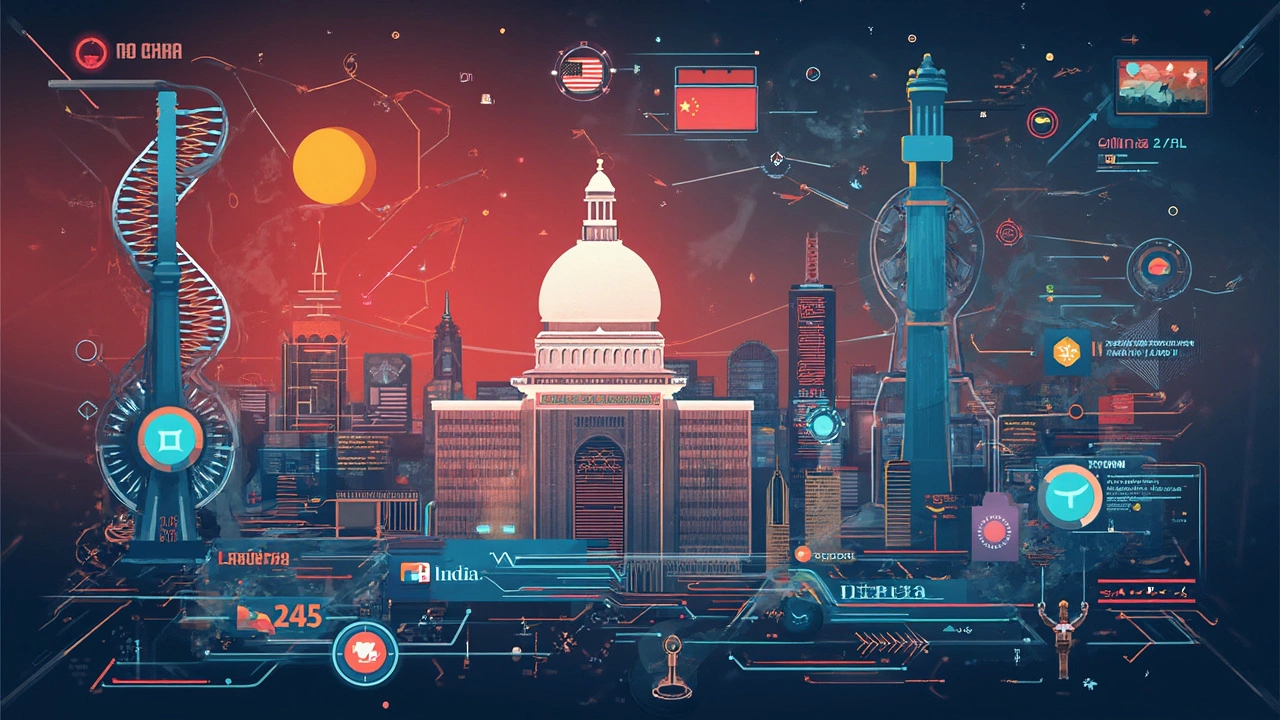Biotechnology Leaders: Who’s Really Running the Show in 2025?
 Apr, 18 2025
Apr, 18 2025
Want to know where the biggest biotech breakthroughs are coming from? It’s not just one country or lab pulling ahead. For every headline about Silicon Valley or a new gene-editing tool, there’s a whole system behind it: research funding, clever scientists, and startups willing to take big risks.
The US usually grabs the spotlight, but lately, places like China, India, and even Singapore are making bold moves—sometimes outpacing the traditional leaders. Global biotech isn’t a race with a single winner. The leaders shift as new discoveries hit the news, new policies pass, or new pandemics hit. That means the stuff shaping your health, the food you eat, and even the way we fight climate change could come from anywhere.
If you really want to stay in the loop, watch where money and talent are flowing, not just who scored the biggest patent last year. The real leaders are often the ones you don’t see in the headlines, quietly fixing supply chains, changing medicine pricing, or rewriting the rules on GMO crops.
- Where the Big Innovations Happen
- Biotech Giants and Startups
- How Governments Shape the Game
- Surprising Global Hotspots
- What’s Next—and How It Affects You
Where the Big Innovations Happen
When you think of jaw-dropping advances in biotechnology, the US usually comes to mind first. There’s a good reason for that: most of the world’s biotech patents and about half of all new biotech startups pop up there, mostly around Boston, San Francisco, and sometimes San Diego. This is where game-changing stuff like CRISPR gene-editing, mRNA vaccines, and smart cancer treatments got their start.
But the US is far from the only heavy hitter. China’s been making huge moves, pouring billions into biotech research and gobbling up more FDA drug approvals every year. Chinese companies CRRC and CanSino Biologics have led the race in COVID-19 vaccine development, and BGI Group is cranking out gene sequencing tech at record speeds. Meanwhile, the European Union, especially Germany and Switzerland, is home to titans like Roche and Novartis and keeps churning out top-notch therapies and diagnostics.
Check out this quick comparison of who’s putting money where their mouth is in global biotech:
| Country | Biotech R&D Spending (USD Billion, 2024) | Number of Startups |
|---|---|---|
| USA | 38 | ~2,700 |
| China | 22 | ~1,400 |
| Germany | 7 | ~400 |
| India | 3.5 | ~800 |
India is another country to watch. It’s quietly turned into the world’s pharmacy, producing vaccines and affordable generics for dozens of nations. Indian biotech firms like Serum Institute rocketed to global fame during the pandemic—showing that impact doesn’t always depend on flashy tech; sometimes it’s about making a difference on a massive scale.
So if you’re tracking biotech innovations, look at who’s testing new drugs, making farming more resilient, or finding wild ways to cut pollution. Tomorrow’s big leap might come from a US venture-backed startup—or a fast-moving Shanghai lab, or even a Mumbai vaccine factory.
Biotech Giants and Startups
If you follow biotechnology leaders, you’ll notice the same big names coming up—companies like Amgen, Genentech (now part of Roche), and Moderna. These giants have the resources to take an idea from lab testing all the way to global clinics, which isn’t cheap. For example, Moderna basically rewrote the playbook on vaccine development during the pandemic, showing how fast things can move when a company bets big on new tech.
But here’s the twist: startups are shaking up the global biotech scene almost every month. Think of CRISPR Therapeutics and Editas Medicine. Five years ago, these were niche teams working on gene editing. Now, they’re hot stocks with FDA-approved tech and clinical trial results that are making headlines. Their size actually helps—they’re flexible, they move fast, and sometimes they partner up with the old-timers to get things done.
The most successful biotechnology advancements often come from the mix of both, not just one or the other. Let’s break down a few key moves:
- Big Pharma buys innovation: Pfizer, Novartis, and Roche routinely buy promising startups. This gives small teams a chance to scale instantly while big companies add new products to their pipeline.
- Collaboration everywhere: Sanofi and BioNTech’s mRNA deal, or AstraZeneca’s work with smaller diagnostic firms, prove that cross-border teamwork is the norm.
- Investment spikes: In 2023, global biotech venture funding topped $45 billion according to PitchBook. This influx keeps new players in the game and lets risky ideas get a real shot.
And here’s something most folks overlook: many of today’s biotechnology leaders started in someone’s garage. Genentech, for example, began as a wild idea in the late 1970s before launching the first commercial biotech drug. The world’s biggest breakthroughs might come from a nameless startup in Boston, Shanghai, or Bengaluru working quietly until someone takes notice.
| Company | Known For | Headquarters |
|---|---|---|
| Moderna | mRNA vaccines, COVID-19 vaccine | USA |
| Genentech/Roche | Cancer drugs, biotech development | USA/Switzerland |
| BioNTech | mRNA tech, COVID-19 vaccine | Germany |
| CRISPR Therapeutics | Gene editing | Switzerland |
| Serum Institute of India | Vaccine manufacturing | India |
If you’re sizing up the future, watch both ends of the spectrum—giants with deep pockets and hungry startups with nothing to lose. This is where the next wave of biotech innovations will pop up first.

How Governments Shape the Game
When it comes to biotechnology advancements, governments call a lot of the shots. It’s not just about throwing money at science labs—although, let’s be honest, funding matters a ton. The US leads global biotech spending, dropping over $45 billion annually into research and development, mostly through agencies like the National Institutes of Health. That’s why American companies like Moderna and Pfizer could roll out COVID-19 vaccines in record time.
China’s catching up fast by boosting cash for its institutes and biotech parks. Their "Made in China 2025" plan aims to make their homegrown biotechnology leaders not just for local needs but to compete worldwide. China’s biotech patent filings exploded in the last decade, and the country’s now the second biggest investor in biotech after the US.
Europe runs things differently—with tight rules on GMOs, but huge support for green biotech. The EU’s Horizon Europe program tossed €95 billion into research, and countries like Denmark and Germany have clusters focused on sustainable food tech and medical innovation. Europe doesn’t go as hard as the US on commercializing, but it’s an incubator for startups with strong ethical standards.
It’s not just rich countries making an impact. India changed the vaccine market with low-cost production, helping almost half of the world’s vaccinated kids. Brazil’s government bet big on biofuels, making homegrown sugarcane ethanol a real alternative to oil for millions.
| Country/Region | Annual Biotech Funding (USD) | Specialty Area |
|---|---|---|
| US | $45B+ | Pharma, Gene Editing |
| China | $20B+ | Genomics, Agriculture |
| EU | $15B+ | Sustainable Food, Biomedicine |
| India | $2B+ | Vaccines, Generics |
Policies matter as much as money. When Canada fast-tracked gene-edited crops, it opened doors for homegrown firms to scale up. In Singapore, friendly tax breaks and clear rules made it a biotech hotspot despite its small size.
If you’re wondering what this means for you, look past the headlines. Every pill, test, or crop comes from decisions made by governments, not just scientists in labs. If you want more innovation—or want to know why your country’s lagging—follow where your leaders are putting their cash and what laws they’re pushing through.
Surprising Global Hotspots
Think leading the world in biotechnology advancements is just about the US, China, and maybe Europe? There are some surprising players making real waves in the global biotech scene that often fly under the radar but are absolutely worth watching.
Singapore is probably the sharpest example. The country’s government has pumped billions into life sciences over the past 15 years, and you see the results everywhere – world-class research labs, major pharma companies setting up shop, and a startup scene that’s punching way above its weight. Biopolis, Singapore’s science and biotech hub, is basically a biotech city. They’ve got a strong track record in stem cells, synthetic biology, and biomanufacturing—stuff you’ll see on shelves soon if you aren’t already.
Now, let’s talk Brazil. Sounds unexpected? Brazil is a leader in agricultural biotechnology. They’ve taken big risks with genetically modified crops and today, they rank as the second biggest producer of GM soybeans and corn after the US. Lots of the technology is home-grown, not imported. This isn’t just about farming—Brazilian firms are also using biotech to turn sugarcane into renewable fuel and even plastic. So if you’re looking for sustainable innovation, don’t sleep on South America.
Israel is another case that surprises people. It has more biotech startups per capita than almost anywhere else. This is where things like the ReWalk robotic exoskeleton for spinal injuries and advanced cancer diagnostics got their start. Israeli biotech is tight with its tech scene, making collaborations in digital health and personalized medicine happen quicker than in most countries. The government backs it up with major grants and tax breaks, fueling the cycle.
| Country | Biotech Focus | Fun Fact |
|---|---|---|
| Singapore | Synthetic Biology, Bio-manufacturing | Largest stem cell bank in Asia |
| Brazil | Agri-biotech, Renewable Fuels | 2nd in global GM crop production |
| Israel | Medical Devices, Digital Health | Highest biotech startups per capita |
Even places like Ireland and South Korea are churning out global breakthroughs. Ireland has become a production hub for biopharmaceuticals (just check where your last COVID vaccine was made), while South Korea is nailing it in biosimilars—think copycat versions of expensive biologic drugs, but more affordable.
If you want to follow the next big thing in biotechnology advancements, don’t just watch the usual giants. These hotspots are leading and shaking up how the world thinks about health, food, and sustainable living.

What’s Next—and How It Affects You
The future of biotechnology advancements is about to get a whole lot more personal, and not just for tech geeks or scientists. Over the next few years, expect to see big changes in the way we approach health, food, and even the environment. Every major player in global biotech is hustling to solve problems that land right on your doorstep.
Gene editing is moving from science fiction to pharmacy shelves. Medicines for rare diseases—think cystic fibrosis or spinal muscular atrophy—are hitting the market faster thanks to CRISPR and next-gen mRNA tech. You’re going to see more custom drugs, made for tiny groups of patients or even single people. The FDA recently reported that nearly 39% of new drug approvals in 2024 came from biotech companies, not big pharma giants.
"Biotech is poised to change the economics of healthcare while tackling global food security at the same time," notes Dr. Robert Langer of the Massachusetts Institute of Technology. "It’s not a matter of if, but how quickly."
If you care about what’s on your plate, check this: lab-grown meat and gene-edited crops are getting cheaper and more common. China has already approved several gene-edited crops for production since 2023, and the U.S. just green-lit new gene-edited beef that cuts greenhouse gases from cattle. That’s a huge deal for climate change. Here’s a quick look at some of what’s coming to your table and medicine cabinet:
- Personalized cancer treatments—think drugs tailored to your DNA.
- More affordable insulin, as startups in India and Brazil scale up biosimilar production.
- Crop plants that resist drought, pests, and disease—with less need for pesticides.
- Lab-grown seafood and meat that taste just like the real thing, but with a smaller environmental toll.
If you’re wondering about side effects, both in your body and on society, don’t worry—you’re not alone. Each new advance brings debates on safety, access, and ethics. The main thing: stay informed and always double-check where your medicine and food come from. Being curious (and a little skeptical) will help you make smarter choices as biotechnology leaders roll out changes faster than ever.
| Area | Biotech Breakthrough | Year | Impact |
|---|---|---|---|
| Healthcare | First CRISPR gene-editing treatment approved | 2023 | Thousands with rare diseases got first-of-its-kind cures |
| Food | Lab-grown chicken hit U.S. shelves | 2024 | Reduced need for traditional farming |
| Agriculture | Drought-tolerant gene-edited soybeans in China | 2025 | Big boost for food security |
Bottom line? The world’s biotech innovations aren’t just buzzwords—they’re quietly speeding toward you, ready to change the choices you make every day, from what’s for dinner to how you treat illness.